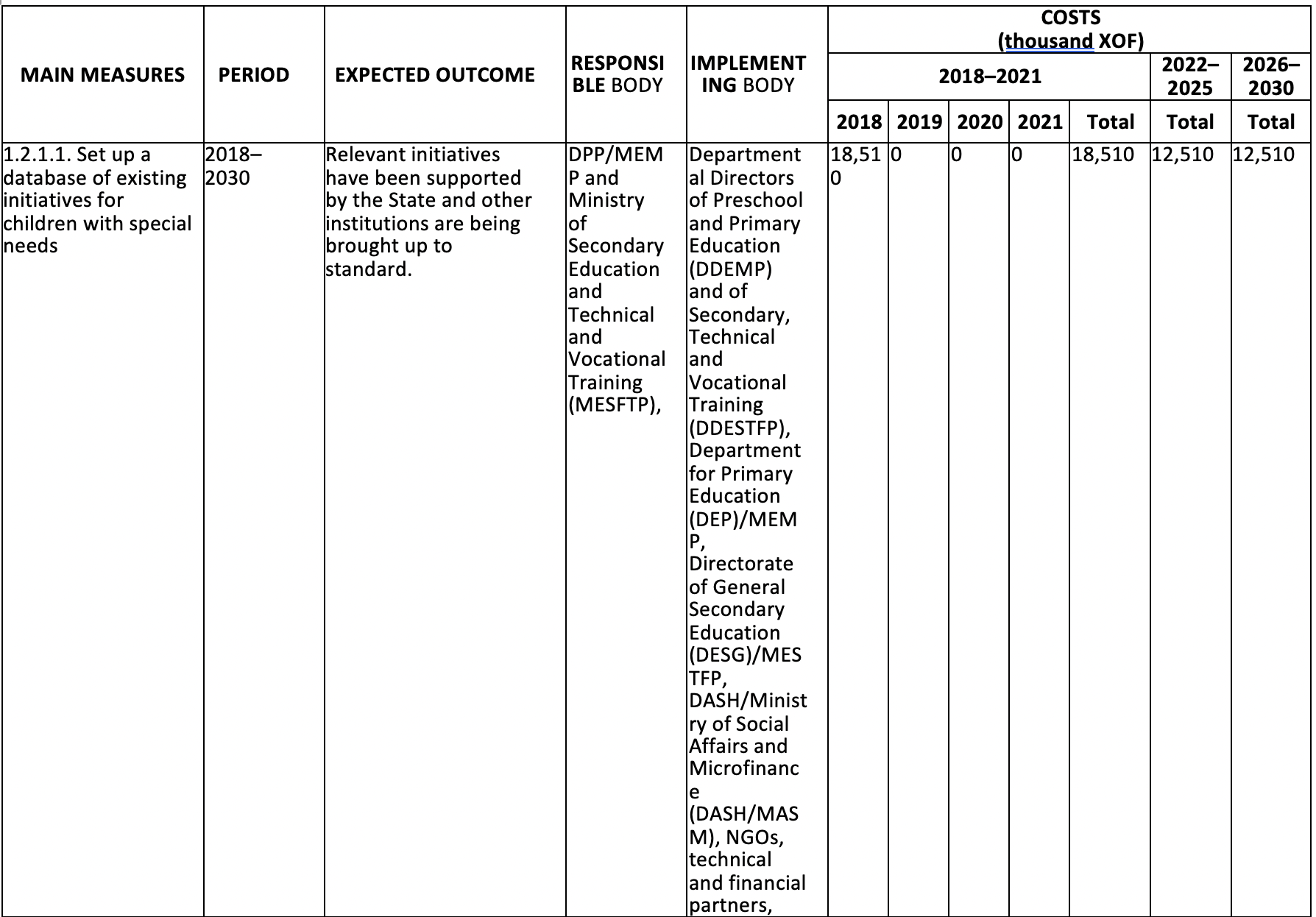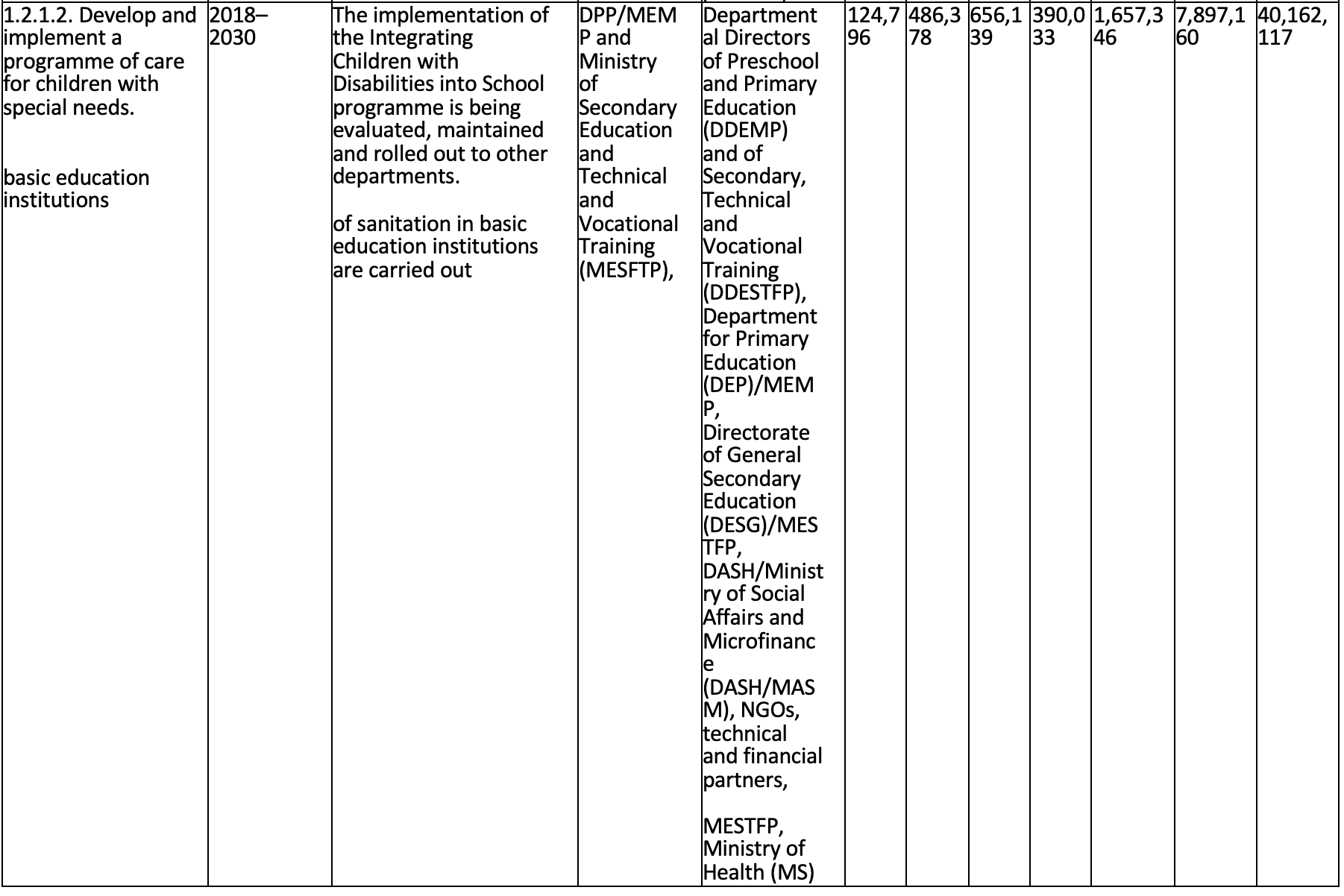FINANCING FOR EQUITY
1. Overall education financing mechanisms
2. Policies and programmes to provide resources to schools
3. Education policies and programmes to provide resources to students and families
4. Social policies and programmes to provide resources to students and their families
Article 13 of the Constitution states that primary education is compulsory and that the State will gradually increase free public education provision. Act No. 2017-06 on the protection and promotion of the rights of persons with disabilities asserts that children and adolescents with disabilities are entitled to receive free and inclusive education at a mainstream public school.
The education sector is governed by four ministries: 1) the Ministry of Preschool and Primary Education (MEMP in French); 2) the Ministry of Secondary Education, Technical and Vocational Training, Retraining and Youth Employment (MESFTP RIJ); 3) the Ministry of Higher Education and Scientific Research (MESRS); and 4) the Ministry of Culture, Literacy, Trades and Tourism (MCAAT).
Financial resources are allocated directly to the central bodies via the Treasury and indirectly to the decentralized bodies and schools. This allocation is the responsibility of four bodies: the Directorate General of the Budget (DGB) of the Ministry of the Economy and Finance (MEF), the Directorates of Financial Resources and Equipment (DRFM) and the Directorates of Programming and Forecasting (DPP) of the education ministries. The allocation of resources to different bodies is not based on actual data or a negotiated policy framework.
The State will maintain the free education measures already in place for preschools and primary schools. As such, spending is forecast at XOF 190.9 billion (USD 327 million) between 2016 and 2030. However, families still have to pay other related costs, including tuition, fees, building fees, and the cost of books, photocopies, supplies, school uniforms and transport. Since 2013, school has been free from the sixth (lower secondary) to the third grade (upper secondary), at an annual cost of XOF 4.5 billion (USD 7.7 million).
Between 2018 and 2030, the Ministry of Education is supporting three specialized (primary) schools at a cost of XOF 900,000 (USD 1,538) per year per school, which represents 2.41 per cent of total estimated expenditure on primary education in 2021 and 3.04 per cent in 2030. All these measures related to the quantity, quality and equity of primary education will result in current expenditure of XOF 132.2 billion in 2030, compared with XOF 111.04 billion in 2021 and XOF 92.7 billion in 2015.
-
Policies and programmes to provide resources to schools
The Global Partnership for Education programme in Benin, in partnership with the World Bank, provides teacher training in disadvantaged districts. This programme covers the country’s 77 communes and 55 per cent of school teachers (22,178 teachers in disadvantaged areas). USD 10 million has been budgeted annually.
Students with disabilities and special needs
The Post-2015 Education Sector Plan (2018–2030) and the National Policy for the Protection and Integration of Persons with Disabilities provide for grants to institutions running educational initiatives for students aged 3 to 15 years with special needs. To this end, XOF 1,486,378,000 (USD 832,064) was budgeted for 2019. Between 2018 and 2021, XOF 3,099,000 (USD 5,313) has been budgeted for training specialized teachers in the country to support children with severe disabilities, with an additional similar amount budgeted for training in Braille writing and sign language. It should be noted that no amount was budgeted for this purpose in 2019 or 2020.
The following table presents the budget for objective 1.2.1: to facilitate access to and integration into education for children with special needs.


Gender
The 2018 budget provided for the allocation of XOF 8.6 billion (USD 14.7 million) – up from XOF 4.2 billion in 2017 (USD 7.2 million) – for increasing girls' secondary school enrolment. In 2019, the State plans to provide support amounting to XOF 5,360,000 (USD 9,165) for the running costs of girls' high schools. Nothing has been budgeted for this purpose for 2018 or 2021.
Rural areas
The 2018–2030 Education Sector Plan provides for the development of community preschools for children in rural areas. This will account for 4 per cent of all preschool provision by 2021 and 10 per cent by 2030. The following criteria have been established for the selection of beneficiary rural areas: low rate of preschool enrolment; no public preschools; being a deprived area; engagement of local authorities.
Poverty reduction
The 2018–2030 Education Sector Plan aims to increase the resources available to the school canteen programme in 2019, in order to increase coverage to 51 per cent of Benin's public schools (from 31 per cent in 2018). The MEMP has therefore planned for an increase of 7.45 per cent to support 1,600 new school canteens. The State invested XOF 10.1 billion (USD 17 million) in school canteens in 2017 and XOF 13.5 billion (USD 23.1 million) in 2018.
The following table presents the forecast budget for objective 1.2.3: to expand access opportunities for out-of-school children, children from poor households and children living in areas with low levels of schooling.

Finally, at the post-secondary level, XOF 72,440,000 (USD 123,897) in 2019 (total of XOF 524,535,000 (USD 897,134) between 2018 and 2021) has been budgeted to finance objective 2.2.2. of the 2018–2030 Education Sector Plan, which aims to improve access to and retention in post-basic education for people aged 15 and over with special needs, from poor households and/or living in areas with low levels of education.
Gender
The Post-2015 Education Sector Plan (2018-2030) aims to promote girls' access to, and retention in, education by waiving secondary school fees for girls. XOF 3,752,172,000 (USD 6.4 million) has been budgeted for 2019.
The plan also aims to promote girls in agricultural and industrial fields, in particular through scholarships and prizes. XOF 178,831,000 (USD 306,023) has been budgeted for this purpose between 2018 and 2021. Finally, girls enjoy free public secondary school tuition (costed at XOF 15,626,617,000 (USD 26.7 million) between 2018 and 2021).
The 2018–2030 Education Sector Plan also provides for microcredit (loans of small amounts for families who do not have access to the banking system) for students’ parents. However, this measure is merely envisaged and no amount has been specified or allocated for this purpose at this stage. The plan also provides for annual merit-based scholarships for vocational learners. XOF 717,414,000 (USD 1.2 million) (unspecified amount) has been budgeted for this purpose in 2019.
The Integrated National School Feeding Programme (PNASI in French), funded by the Government of Benin and the World Food Programme (WFP), targets students from the most economically vulnerable groups and areas. USD 20 million is invested annually to directly support 1,574 schools (51 per cent of schools in Benin) and 351,109 beneficiaries.
The Ministry of Social Affairs and Microfinance (MASM) had a total budget of XOF 4.5 billion (USD 7.7 million) in 2018 and XOF 6.1 billion (USD 10.4 million) in 2015. Among its responsibilities, the MASM implements measures for students and families, including materials for girls, mobility aids (tricycles, walking sticks, crutches and wheelchairs) and support for people living in poverty and for the integration of people with disabilities. It also provides for other social welfare activities for students and their families, including exemption from school fees, rehabilitation and vocational training in weaving rush mats and making string chairs for visually impaired people, provision of Braille materials and technical assistance, training in adapted computer technology, integration and social reintegration of visually impaired people.








